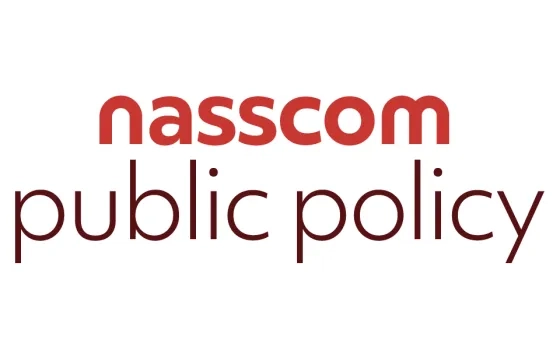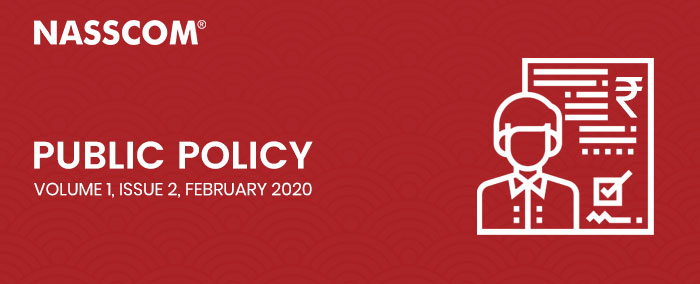 |
| | In Focus | |  | |
|
| | | | | | NASSCOM Industry Consultation Paper on the Customs Moratorium on Electronic Transmissions | | | | The debate around the customs moratorium on electronic transmissions (also called the e-commerce moratorium) has lingered on through the course of several WTO ministerial conferences. What was initially meant to be a “temporary moratorium” has now been in place for over 20 years, being rolled over biennially at successive ministerial conferences. | | | | Last year, India and South Africa raised questions over the costs and benefits of the extant moratorium, as the US and the EU continued to push for a permanent moratorium. With global digital trade having increased by leaps and bounds since the Geneva Ministerial Declaration of 1998, there is a certain sense of urgency towards resolving the issue in the upcoming 12th Ministerial Conference in Nur-Sultan, Kazakhstan (MC12).
In this backdrop, NASSCOM, on 24 January 2020, released an Industry Consultation Paper, with a view to framing India’s position on the issue ahead of the MC12 slated to be held in June 2020.
NASSCOM is in the process of compiling inputs received from the industry as of January 2020 and presenting the outcomes of the consultation to the Government of India soon. Read More | | 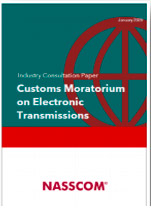 | | |
|
| |
| |
|
| | | | RBI permits Video-based KYC | | | | On 9 January 2020, in a welcome step, the Reserve Bank of India (RBI) issued a circular to amend the Master Direction on know-your-customer (KYC). The circular enables leveraging of digital channels for Customer Identification Process (CIP) by Regulated Entities (REs). It permits Video based Customer Identification Process (V-CIP) as an alternate method of establishing the customer’s identity, for customer on-boarding. | | | |  | | NASSCOM had made several representations to the Department of Revenue, Unique Identification Authority of India (UIDAI), NITI Aayog, Ministry of Electronics & Information Technology (MeitY) and RBI with a request to permit video KYC as a method for doing digital KYC and to enable e-KYC for prepaid payments instruments (PPIs).
Read More | | |
|
| |
| |
|
|
|
| | | |  | | Fourth Consultation Session on Personal Data Protection Bill, 2019 | | | | | |  | | | | | | 13 January 2020, Bangalore | | | | | NASSCOM conducted a stakeholder consultation on promoting Karnataka as the Global Engineering and Design destination. The event saw participation from 12 companies. The discussion helped to identify the relevant issues to be addressed, and possible solutions. NASSCOM will work on developing a strategy paper to present to the Government of Karnataka. | | |
| | | |  | | Roundtable on MDR and Digital Payments Adoption | | | | | |  | | | | | | 17 January 2020, Mumbai | | | | | | NASSCOM conducted a roundtable on issues relating to zero MDR and digital payments adoption in Mumbai. The session saw active participation from several prominent payment service providers and fintech companies. The inputs from every participant has been noted and we are finalizing our representation to the government based on discussions at the roundtable. | |  | |
| | |
| | | |  | | Interactive Workshop on Code on Wages | | | | | |  | | | | | | 22 January 2020, Hyderabad | | | | |  | | NASSCOM in association with Nishith Desai Associates organized an interactive workshop on the Code on Wages, 2019 in Hyderabad. The objective of the workshop was to create awareness among the members of the industry on the various provisions of the code and compliance requirements that employers would be required to follow. More than 60 industry participants attended the workshop. | |
| | |
| | | |  | | Interaction with Student Delegation from University of Melbourne | | | | | |  | | | | | | 23 January 2020, NCR | | | | | NASSCOM interacted with a student delegation from University of Melbourne. The delegation visited NASSCOM as part of an international study tour to know about doing business in India, and the role, which NASSCOM is playing in promoting innovation, tech adoption and skilling in India. | | |
| | | |  | | Roundtable interaction with industry on policy and regulatory issues affecting the IT-BPM companies | | | | | |  | | | | | | 28 January 2020, Pune | | | | | | NASSCOM organized a roundtable interaction with the industry leaders in Pune. The objective of the roundtable was to discuss and give industry members an update on the key policy and regulatory issues that are critical from the IT industry standpoint. | |  | | | | Several issues ranging from impact of the proposed Personal Data protection law on the IT companies, policies around work from home, impact of the proposed labour codes on social security, industrial relations, GST issues and NASSCOM budget recommendation were discussed. More than 20 leaders from the BPM and GCC community participated in the discussion. | |
| | |
| | Recent Industry Representations & Submissions | | |  | | Submission of Inputs under Goods & Service Tax (GST) Act to Public Accounts Committee | | | | | |  | | | | | | 6 January 2020 | | | | | NASSCOM submitted a detailed note to OSD (States) highlighting suggestions to address GST related issues faced by IT- BPM industry. The inputs have been submitted to Public Accounts Committee (2019-20) formed under the Chairmanship of Shri Adhir Ranjan Chowdhury, Member of Parliament. For more details contact tejasvi@nasscom.in | | |
| |  | | Feedback to the Parliamentary Standing Committee on Social Security and Industrial Relations Code | | | | | |  | | | | | | 20 January 2020 | | | | | NASSCOM submitted its comments on the Code on Social Security, 2019 and the Code on Industrial Relations, 2019, which were introduced in Lok Sabha in December 2019 by the Minister of Labour and Employment. These Codes were later referred to the Standing Committee on Labour, chaired by Shri Bhartruhari Mahtab, MP. Read More | | |
| |  | | Submission of Inputs for 12th Customs Consultative Group (CCG) Meeting | | | | | |  | | | | | | 20 January 2020 | | | | | Based on inputs from members, NASSCOM submitted issues for the 12th Customs Consultative Group (CCG) Meeting to Directorate General of Exports Promotion (DGEP). Among other things, we have suggested that loaned equipment imported for software development and testing purposes should not be subjected to BIS and EPRA compliances, separate valuation rules be issued for imports done on ‘free of cost’ or on loan basis from related party and commercial samples carried under ‘hand carry’ route for undertaking research and development (R&D) should be allowed .The meeting is likely to happen during February 2020. For more details contact tejasvi@nasscom.in | |
| | |  | | Submission to Central Board of Indirect Taxes & Customs (CBIC) Chairman to discuss Intermediary issue under GST | | | | | |  | | | | | | 23 January 2020 | | | | | NASSCOM highlighted to the CBIC chairman the delay in addressing the issue. We stressed that given the larger impact of uncertainty around the treatment of services provided by IT-ITeS, as submitted in several of our representations in the past, there is an urgent need to take a holistic view on this matter. However, as an immediate action, government should evaluate and implement the following alternative measures:Amendment in the GST Law (IGST Act): We requested the Government to amend Integrated Goods and Services Tax Act, 2017 (‘IGST Act’) as follows:- Proviso to be added in Section 13(8)(b) of IGST Act, 2017: “Provided that nothing contained in this clause shall apply in case of services in the nature of ITeS which are provided by a supplier located in taxable territory.”
- Further, Explanation should be added after Explanation (d) to section 13(8) of IGST Act, 2017 to provide the definition of ‘ITeS’: “(e) ‘ITeS services’ shall have the same meaning as defined under the sub-rule (e) of rule 10TA of the Income-tax Rules, 1962.”
Issuance of a revised circular: Alternatively, Government should expedite issuance of revised Circular indicating the kind of supply that would qualify as intermediary services and those that would not qualify as such. NASSCOM also placed on record its request to consider removing the concept of intermediary in entirety in the long run. CBIC assured us that they are considering the matter and will take it after the Union Budget. | |
| | |  | | Representation to Haryana Government on easing the process of seeking permission for engaging women in night shifts | | | | | |  | | | | | | 29 January 2020 | | | | | NASSCOM recently made a submission to Haryana Labour department highlighting the industry concerns regarding excessive delay in getting approvals from the department for engaging women in night shifts. We have suggested that Government should expedite the process towards ensuring operational certainty and compliance. Further, we have suggested that the Government should do away with the process of seeking annual approvals and make it a one-time process subject to periodic checks/inspections. | |
| | |  | | Representation to CBDT in relation to the notification of prescribed electronic modes under the Income Tax Act | | | | | |  | | | | | | 29 January 2020 | | | | | NASSCOM made a representation to the Central Board of Direct Taxation (CBDT) and Department of Revenue on issues faced by the IT industry due to prescribed electronic modes under section 269SU of the Income-Tax Act, 1961. We have highlighted the issues faced by the industry and suggested ways to address these issues. We also sought an extension of deadline for implementation of the circular issued by CBDT on this. | | |
| |
| | |
|
|
|
| | | |  | | Discussion with MeitY on IT (Intermediary Guidelines) Rules | | | | | |  | | | | | | 8 January 2020 | | | | | NASSCOM met with Officials at MeitY to discuss issues pertaining to the Information Technology (Intermediary Guidelines) Rules. The key points of discussion included, maintenance of differential obligations for social media intermediaries, and other non-public intermediaries such as cloud service providers, network service providers, etc. Further, NASSCOM also emphasized the need for an efficient framework to ensure greater collaboration between government agencies and social media intermediaries towards tackling key risks. | | |
| | | |  | | Meeting with DoCA on Consumer Protection (E-Commerce) Rules | | | | | |  | | | | | | 10 January 2020 | | | | | NASSCOM met the Joint Secretary, Consumer Affairs, to discuss NASSCOM’s submissions on the draft Consumer Protection (e-Commerce) Rules proposed to be notified under the Consumer Protection Act, 2019. NASSCOM’s submissions focused on greater definitional clarity, rationalizing of obligations in line with activities undertaken by the relevant entity in the e-commerce supply chain, and ensuring faster and efficient redressal while addressing key business risks faced by e-commerce marketplaces such as a disintermediation risk. | | |
| | | |  | | Meeting with MeitY to discuss classification of software products under Harmonized System of Nomenclature (HSN) Codes | | | | | |  | | | | | | 10 January 2020 | | | | | National Policy on Software Products (NPSP) – 2019 envisaged and proposed that a classification system for Indian Software products will be accommodated and evolved through a model HSN code. Due to non-availability of separate HSN code for software products, authentic /promising statistical data of industry is not available. The proper classification of Software Products and Software services will benefit in tracking of software industry (software product and software services separately), thereby enabling tracking of data which would further help in taking informed and supportive decision for the promotion & expansion of Indian software product industry. In this regard, NASSCOM met officials of MeitY to discuss appropriate classification of software products under HSN Codes. Joint Commissioner (Customs) attended the meeting along with officials of MeitY, iSpirt and NASSCOM. | | |
| | | |  | | Meeting with CBDT to discuss Organization for Economic Cooperation and Development (OECD) Unified Approach and implications for India | | | | | |  | | | | | | 16 January 2020 | | | | | NASSCOM met officials of Ministry of Finance to highlight the broad impact of nexus and profit allocation rule described in OECD’s Unified Approach. Joint Secretary (FT&TR-1) chaired the meeting. During the meeting, NASSCOM made a presentation to highlight the ambiguities in the OECD approach and the aspects that the Indian government should highlight to the OECD to bring clarity on taxing digital companies. | | |
| | | |  | | Meeting with MeitY to review the applicability of SOFTEX Form for Software products | | | | | |  | | | | | | 27 January 2020 | | | | | NASSCOM met the Joint Secretary, MeitY to review the applicability of SOFTEX Form for Software products to strengthen ease of doing business for software product industry under National Policy on Software Products (NPSP) 2019. Officials of MeitY, Reserve Bank of India (RBI), Department of Commerce (DoC), iSpirt and NASSCOM attended the meeting. | | |
| | | |  | | Meeting with Karnataka Government on ER&D | | | | | |  | | | | | | 31 January 2020 | | | | | NASSCOM along with industry members presented an action plan to the Additional Chief Secretary for IT & BT, Government of Karnataka on how Karnataka can attract ER&D companies. The action plan was drafted by the policy team and the R&D team. | | |
|
| | |
|
|
| | | Upcoming Public Policy Events | |  | | | | 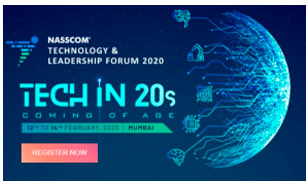 | | | Policy@NTLF: Global Data Regulation: Geo-Politics and Trade | | | 12 February 2020, Mumbai | | | A policy roundtable on “Global Data Regulation: Geo-Politics and Trade” will be conducted at the NASSCOM Technology and Leadership Forum, 2020 (NTLF2020), being held in Mumbai from 12 to 14 February 2020.This is a closed-door event and attendance by invite only. |
| | |
| | | | | NASSCOM Roundtable on WTO Moratorium on Electronic Transmissions | | | February 2020, New Delhi | | | NASSCOM invites the industry to join us towards discussing the way forward for India on the issue of the customs moratorium on electronic transmissions at the Roundtable on WTO Customs Moratorium on Electronic Transmissions being organized in New Delhi in February. More details to follow closer to the event. For a background and more information relating to the customs moratorium, read the NASSCOM Industry Consultation Paper on the subject. |
| | 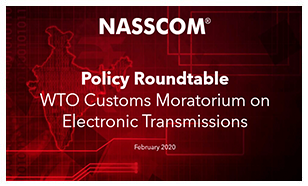 | | |
| | | | 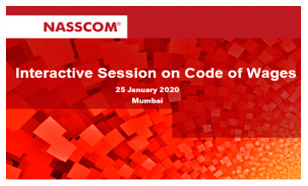 | | | Interactive Session on Code on Wages | | | 25 February 2020, Mumbai | | | NASSCOM invites you to interactive workshop on the Code on Wages, 2019 to be held in Mumbai on 25 February 2020. Contact deepak@nasscom.in for more details. |
| | |
| | | | | Policy Discussion Paper Launch: Regulating Encryption in India | | | 28 February 2020, TBC | | | NASSCOM invites you to the launch of its Policy Discussion Paper on Regulating Encryption in India – which tries to focus the debate towards finding a balanced way forward for individuals, corporations and law enforcement to work with encryption technologies. The launch event will be organized on 28 February 2020. Full program details to follow. |
| | 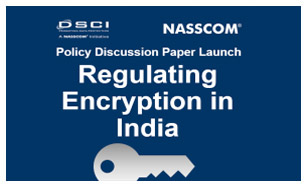 | | |
|
| | |
|
|
|
| | Foreign Trade | | | | | DGFT Issues Trade Notice Regarding Importation of Goods under ‘Others’ Category | | | | | |  | | | | | | The DGFT, vide Trade Notice No. 46/2019-20 (dated 17 January 2020) announced that it is reviewing importation of goods under ‘others’ category in light of misclassification of goods by importers. In an earlier Trade Notice No. 37/2019, the DGFT had specifically advised the industry to mention specific HS codes at 8-digit level while filling Bill of Entry at the time of import. The latest Trade Notice states that the government may consider bringing a licensing regime for all items imported under the ‘others’ category by shifting these items from ‘free’ to ‘restricted’ category. The Trade Notice also invites suggestions from the industry on appropriate HS codes at 8-digit level for goods that the industry is importing, for which existing HS codes are not sufficient. Read more | | |
| | Start-ups | | | | | Formulation of Start-up Advisory Council to address regulatory issues of start-ups | | | | | |  | | | | | | Department for Promotion of Industry and Internal Trade (DPIIT) recently decided to constitute a start-up advisory council to study various regulatory issues impacting growth of start-ups in India. The Council will provide an institutional platform to the start-up eco-system wherein stakeholders will be able to highlight their concerns and engage with the government. In effect, the Council will act as a bridge between the start-up community as well as the government and all the regulators. Read more | | |
| | | Company Law | | | | | MCA Clarification on CSR: Unspent CSR amount must be carried forward and spent | | | | | |  | | | | | | As per section 135 of Companies Act, 2013 (Companies Act), certain companies are required to spend at least 2% of their average net profits as Corporate Social Responsibility (CSR). Further, as per 2nd proviso to sub-section 5 of section 135, “if a company fails to spend CSR amount, the Board shall, in its report, specify reasons for not spending the amount.”
In a recent communication to NASSCOM, Ministry of Corporate Affairs (MCA) has clarified that in order to comply with this mandate, companies need to compulsorily spend the entire CSR amount (i.e. 2% of the net profits of the company). Accordingly, even if the Director’s Report specifies valid reasons for not spending CSR amount, failure to spend the stipulated 2% amount will still be considered non-compliance. This is on account of the term, “shall”, used in Section 135(5) of the Companies Act. Accordingly, in the event of non-compliance in a given FY, CSR obligation will get carried forward until it is fulfilled. Read more | |
| | | | | SEBI releases Report of the Working Group on Related Party Transactions | | | | | |  | | | | | | The Securities and Exchange Board of India (SEBI) released Working Group’s Report on Related Party Transactions (RPTs) proposing a slew of changes to strengthen the laws for regulation and oversight of RPTs. The Working Group recommends that the definition of ‘related party’ under the LODR should deem: (i) all persons or entities belonging to the ‘promoter’ or ‘promoter group’, irrespective of their shareholding in the listed entity, or (ii) any person or any entity, directly or indirectly (including with their relatives), holding 20% or more of the equity shareholding in the listed entity, to be a related party. Further, observing that recently, certain innovative structures have been used to avoid classification of transactions as RPTs, the Group suggests extensive changes to the definition of RPTs. Read more | | |
| | | Labour | | | | | Haryana Government allows offline contributions for Labor Welfare Fund | | | | | |  | | | | | | The Haryana labor department vide notification No HL WB /REVE/ 380-591 dated 17.01.2020, has decided to accept the payment towards Labor Welfare Fund (LWF) through an offline mode. According to this notification, shops and commercial establishments in Haryana will now be able to make offline contribution towards LWF by submitting a draft favoring Welfare Commissioner, Haryana payable at Panchkula. Earlier, NASSCOM had highlighted technical issues being faced by the companies with the portal and requested for an alternate solution for making contributions till those concerns are addressed.
In a separate notification. The Government has also decided to extend the deadline for the LWF contribution for the year 2019 to 31.03.2020. Read more | | |
|
| |
|
|
| | | Follow us on | |  | | | |
| |
|
|






















![[Analysis] Parliament’s Standing Committee Report Calls for Strengthening CCI and Proposes Refinements in the Digital Competition Bill](https://community.nasscom.in/sites/default/files/styles/560_x_350/public/media/images/For%20Blog%20-nasscom%20public%20policy%20960%20x%20600%20png_14.png.webp?itok=TVoaAkX5)



